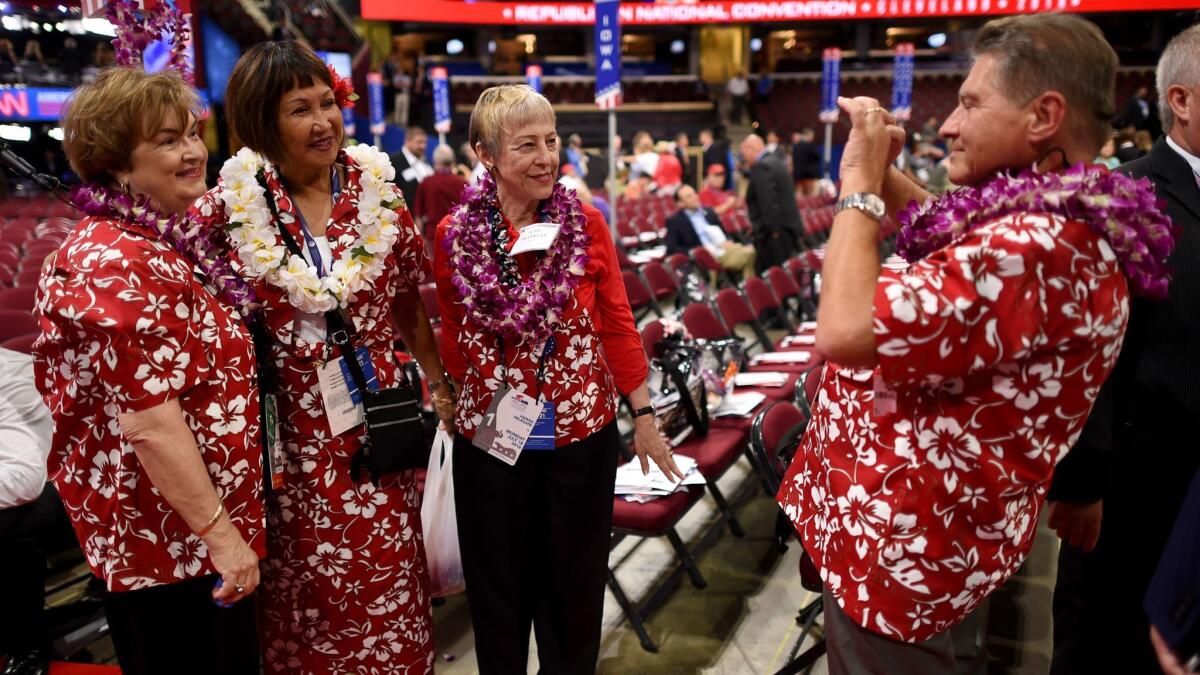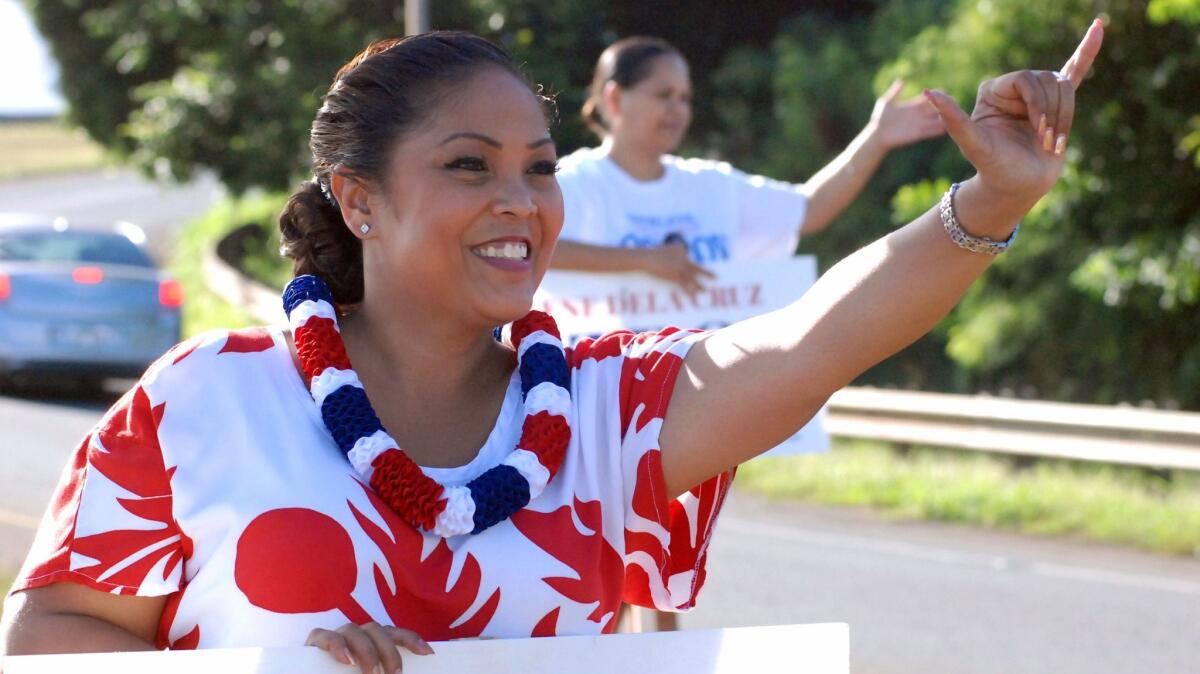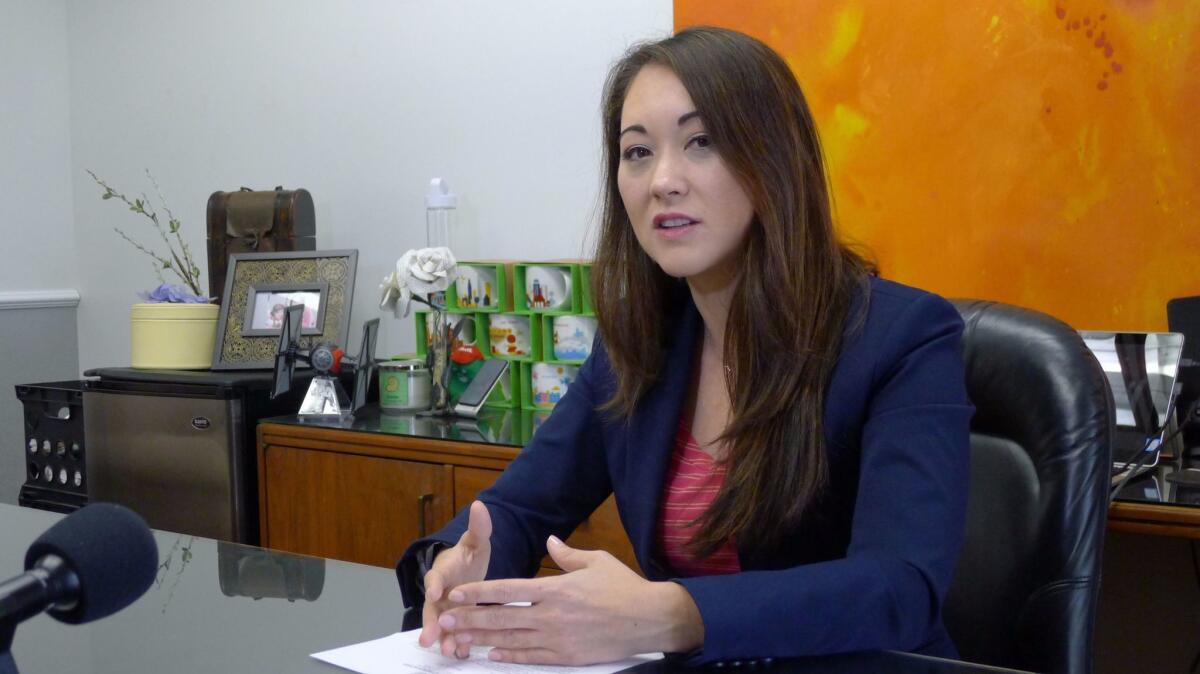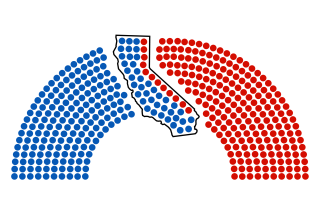The Republican Party is almost extinct in Hawaii – and it’s only getting worse

It has been a rough few days for Republicans, who lost big in mayoral and gubernatorial races across the country in Tuesday’s election. But Shirlene Ostrov knows it can be much worse.
She is the chairwoman of the Republican Party in Hawaii.
The job can be lonely and thankless. Her party is teetering on the edge of extinction here.
The last time Hawaii had a Republican in the U.S. Senate was 1977. Since becoming a state in 1959, it’s had just two GOP members in the U.S. House of Representatives, most recently in 2011.
In the state Senate, all 25 members are now Democrats, since a lone Republican, Sam Slom, lost his reelection bid last November after 20 years in office.
In the 51-member state House, there are five Republicans — down from six in March, when one switched parties after denouncing President Trump.
“Obviously, it’s disappointing to lose,” Ostrov said about the defeats of Republicans last Tuesday in gubernatorial races in Virginia and New Jersey. “But I see the numbers, and the Republican Party in the contiguous United States is doing amazing.”
Republicans not only have the presidency and Congress but a lock on the majority of statehouses and governorships, she was quick to point out.
“In Hawaii, the picture is different,” she said.
Last year she ran for the U.S. House and lost to a Democrat who received nearly three times as many votes. It was a typical showing in what is essentially a one-party state.
“The success of Republicans nationally has had little effect in Hawaii,” said Patricia Saiki, a Republican who represented the state in the U.S. House from 1987 to 1991. “If anything, it solidified the Democratic grip here.”

There was a time when Republicans held most of the power: when Hawaii was still a territory and controlled by white landowners. But as statehood approached, Native Hawaiians and Asian immigrants working on sugar plantations waged union campaigns — the beginning of a Democratic takeover.
The Republican Party’s best stretch since then was the eight years that Republican Linda Lingle served as governor, the second member of her party to hold that office. Her term expired in 2010.
It’s not as though Democrats have solved all the state’s problems. Hawaii has the nation’s highest homelessness rate, and in Honolulu, some of its worst traffic. Still, Republicans keep losing.
Last November, it was no surprise when Trump received 30% of votes cast by Hawaii residents — his lowest total in any state. Perhaps already knowing the results, many Hawaii residents didn’t bother to vote. Turnout was 43%.
Things have only gotten worse for the party since then.

In January at the Women’s March in Honolulu, state Rep. Beth Fukumoto, one of the party’s biggest hopes in Hawaii, criticized Trump for “racist and sexist” remarks.
Her five Republican colleagues responded the next month by telling her to drop her post as House minority leader.
Fed up, she left the party in March and became a Democrat. This month, 34-year-old Fukumoto announced she was considering a run for Congress.
Many Republicans in Hawaii lean to the left of their mainland counterparts, having taken up causes such as climate change and income inequality.
Fukumoto says statements by Trump on Muslims, women and immigrants are likely to damage the Republican Party’s standing in Hawaii even more.
“The party in Hawaii is now the party of Trump, and I think the association is going to hurt them,” she said.
Miriam Hellreich, a Honolulu-based member of the Republican National Committee, disagreed.
“Elections go in cycles, and we’ve been in a difficult downward cycle that’s hard to escape,” she said. “But we have a lot of people who are Republicans but just don’t know it. They are traditional Democrats because that’s how their family voted.”
Republican Party officials say they hope Trump’s 19-hour overnight stop in Oahu this month — his first visit to Hawaii as president — would boost morale.
Party members wanted him to formally meet with them, but the closest they got was the tarmac at Joint Base Pearl Harbor-Hickam, where they snapped selfies next to him in a lei after Air Force One landed.
His schedule included visits to U.S. Pacific Command, the USS Arizona Memorial at Pearl Harbor and a stop at the Trump hotel in Waikiki — the owners license the Trump name — before he flew to Japan.
Hawaii Republicans got more face time late last month with one of the president’s surrogates, Mike Huckabee.
At a fundraiser outside Honolulu, the former Arkansas governor and father of White House Press Secretary Sarah Huckabee Sanders spoke for nearly an hour about the future of the party, both locally and nationally.
“Boy, we’re a minority here, you think?” he said.
Huckabee said it didn’t have to be that way. “You are not destined to be the minority party for the rest of your lives, because you have a message,” he said. “You have core convictions and values that, quite frankly, I believe resonate with people wherever they live.”
Ostrov, the state party chairwoman who helped organize the event, said one of its goals was to raise money to bring more diverse communities into the Republican fold.
“There are a lot of people who are not happy with how the state is run, such as with our incredibly high taxes,” she said. “I hope for Hawaii to one day have a healthy, vibrant two-party system.”
For now, though, when things go wrong in Hawaii, Ostrov said, “You don’t have to think hard about who’s responsible.
“It’s Democrats.”
Jaweed Kaleem is The Times’ national race and justice correspondent. Follow him on Twitter, Facebook and Instagram.
More to Read
Start your day right
Sign up for Essential California for news, features and recommendations from the L.A. Times and beyond in your inbox six days a week.
You may occasionally receive promotional content from the Los Angeles Times.







